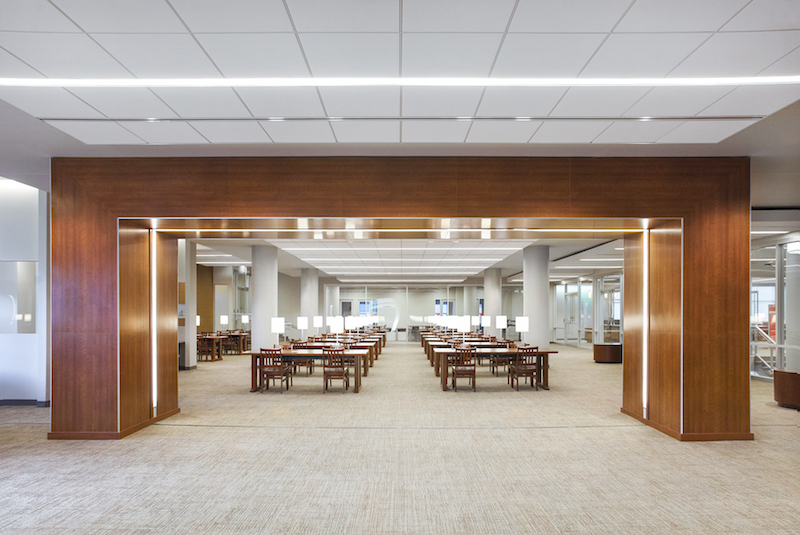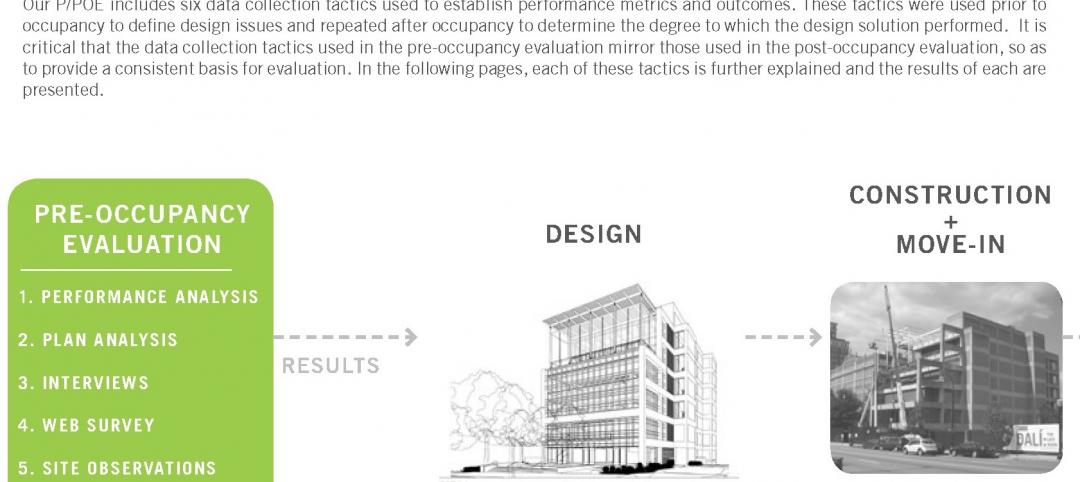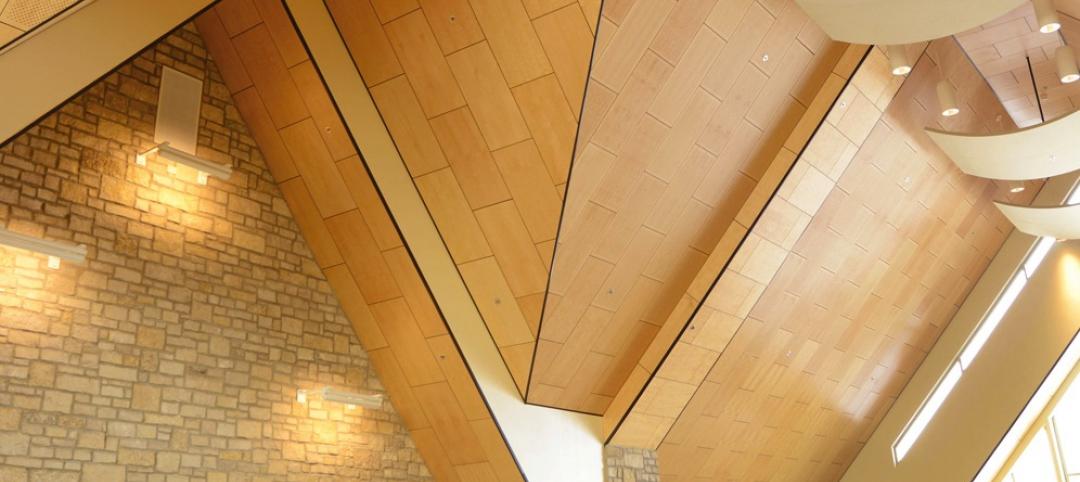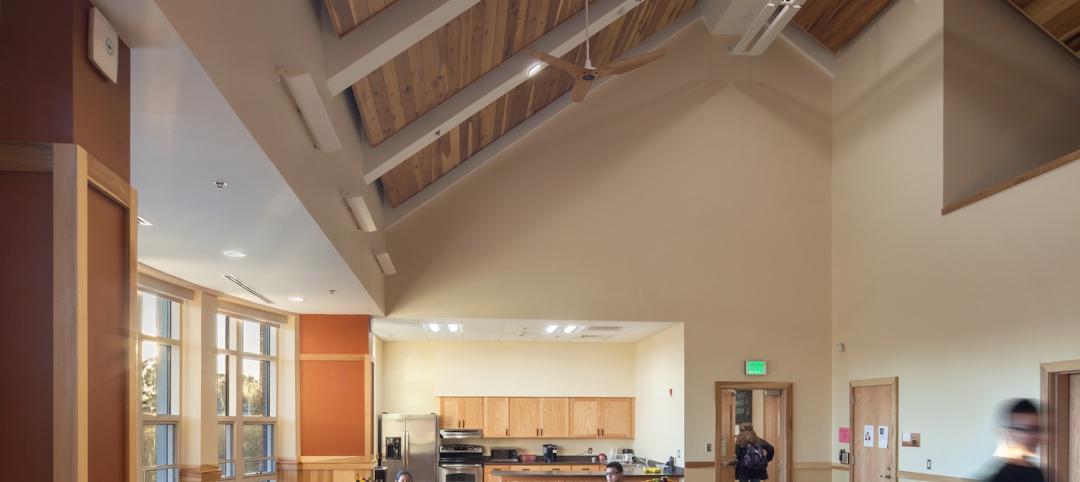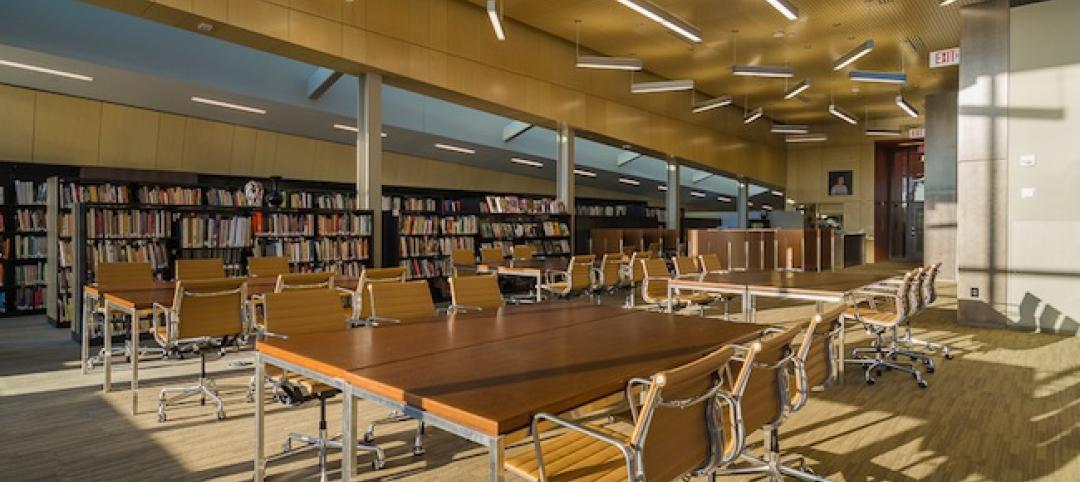Libraries remain one of the typologies that colleges and universities continue to invest in avidly. And most new construction and renovation seems to focus on creating spaces where students and even faculty can collaborate.
A recent example is the $15 million, 21,000-sf expansion of LaGuardia Community College in Long Island City, N.Y., which debuted May 12. This library, with more than 650,000 visitors annually, is one of the campus’s most heavily used spaces, and its expansion “is long overdue,” says the college’s president Gail O. Mellow.
The expansion converted a section of the second floor at the college’s E-building, which had been used for offices and classrooms, into more library space above the library’s existing mezzanine. It made the existing, previously single-floor, library 60% larger, and increased its seating capacity 74% to 732 by adding 312 workstations powered by Internet connections in each.
The new floor includes a 5,750-sf courtyard reading room, the 2,790-sf Thomson Reading Room, a 1,570-sf media lab, 1,360-sf archive room, a video editing room, a recording room, a language lab, offices, 11 group study rooms, restrooms, storage spaces, and mechanical and data rooms. There are also 50 new offices.
To achieve this expansion, the construction team—which included IBI Group Gruzen Samton (architect), Stalco Construction (GC), and AECOM (CM)—removed the original stairs from the main floor to the mezzanine, and cut a 50x60-ft opening into the concrete slab of the second-floor library space for a new structural steel staircase with wooden treads and handrails.
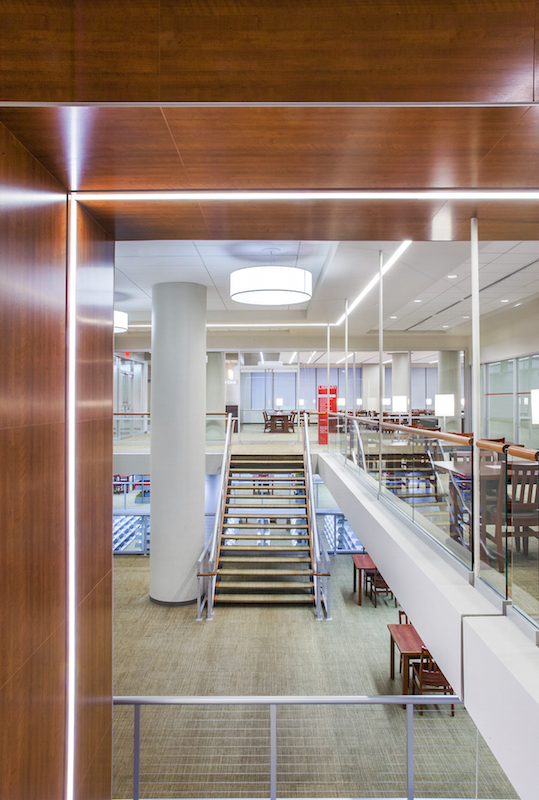
The construction team cut a 50x60-ft opening in the concrete slab of the new second-floor library space to accommodate a new staircase. Image: Ola Photography
The opening of the second floor is an architectural feature with glass sides that allow patrons to see into the library.
The challenges of this project included working while the existing library was in operation. Construction crews accessed the site through the exterior wall opening, and materials deliveries came through a ramp or a hoist through the second-floor opening. (The new stair was carried in sections through the exterior all and assembled onsite.) The crews never had access to the building’s elevator.
A temporary wall mitigated noise and dust. And when possible, the crews worked while students were away, on weekends and during spring break.
Other stakeholders on this project included the Dormitory Authority of the State of New York. LaGuardia Community College is part of the City University of New York system, and educates 50,000 New Yorkers annually. Its student population is largely lower-income, new-immigrant, or otherwise disadvantaged.
The Building Team included Joseph R. Loring & Associates (MEP), Ysrael A. Seinuk, P.C. (SE), and Whitehouse Lighting Design (lighting). The library’s atrium space above the stair features three oversized round light fixtures, which can be lowered automatically for maintenance.
Phase 2 of this project will focus on the first floor, and renovations will be based in part on input from students, faculty, and staff, according to the college
Related Stories
| Oct 9, 2014
Regulations, demand will accelerate revenue from zero energy buildings, according to study
A new study by Navigant Research projects that public- and private-sector efforts to lower the carbon footprint of new and renovated commercial and residential structures will boost the annual revenue generated by commercial and residential zero energy buildings over the next 20 years by 122.5%, to $1.4 trillion.
| Sep 29, 2014
Snøhetta releases final plan for terraced central library in Calgary
The competition-winning New Central Library is now in the final design stages, after two years of community engagement on the part of design firms Snøhetta and DIALOG.
| Sep 24, 2014
Architecture billings see continued strength, led by institutional sector
On the heels of recording its strongest pace of growth since 2007, there continues to be an increasing level of demand for design services signaled in the latest Architecture Billings Index.
| Sep 22, 2014
4 keys to effective post-occupancy evaluations
Perkins+Will's Janice Barnes covers the four steps that designers should take to create POEs that provide design direction and measure design effectiveness.
| Sep 22, 2014
Sound selections: 12 great choices for ceilings and acoustical walls
From metal mesh panels to concealed-suspension ceilings, here's our roundup of the latest acoustical ceiling and wall products.
| Sep 9, 2014
Using Facebook to transform workplace design
As part of our ongoing studies of how building design influences human behavior in today’s social media-driven world, HOK’s workplace strategists had an idea: Leverage the power of social media to collect data about how people feel about their workplaces and the type of spaces they need to succeed.
| Sep 7, 2014
Behind the scenes of integrated project delivery — successful tools and applications
The underlying variables and tools used to manage collaboration between teams is ultimately the driving for success with IPD, writes CBRE Healthcare's Megan Donham.
| Sep 3, 2014
New designation launched to streamline LEED review process
The LEED Proven Provider designation is designed to minimize the need for additional work during the project review process.
| Sep 2, 2014
Ranked: Top green building sector AEC firms [2014 Giants 300 Report]
AECOM, Gensler, and Turner top BD+C's rankings of the nation's largest green design and construction firms.
| Aug 25, 2014
Ranked: Top cultural facility sector AEC firms [2014 Giants 300 Report]
Arup, Gensler, and Turner head BD+C's rankings of design and construction firms with the most revenue from cultural facility projects, as reported in the 2014 Giants 300 Report.


